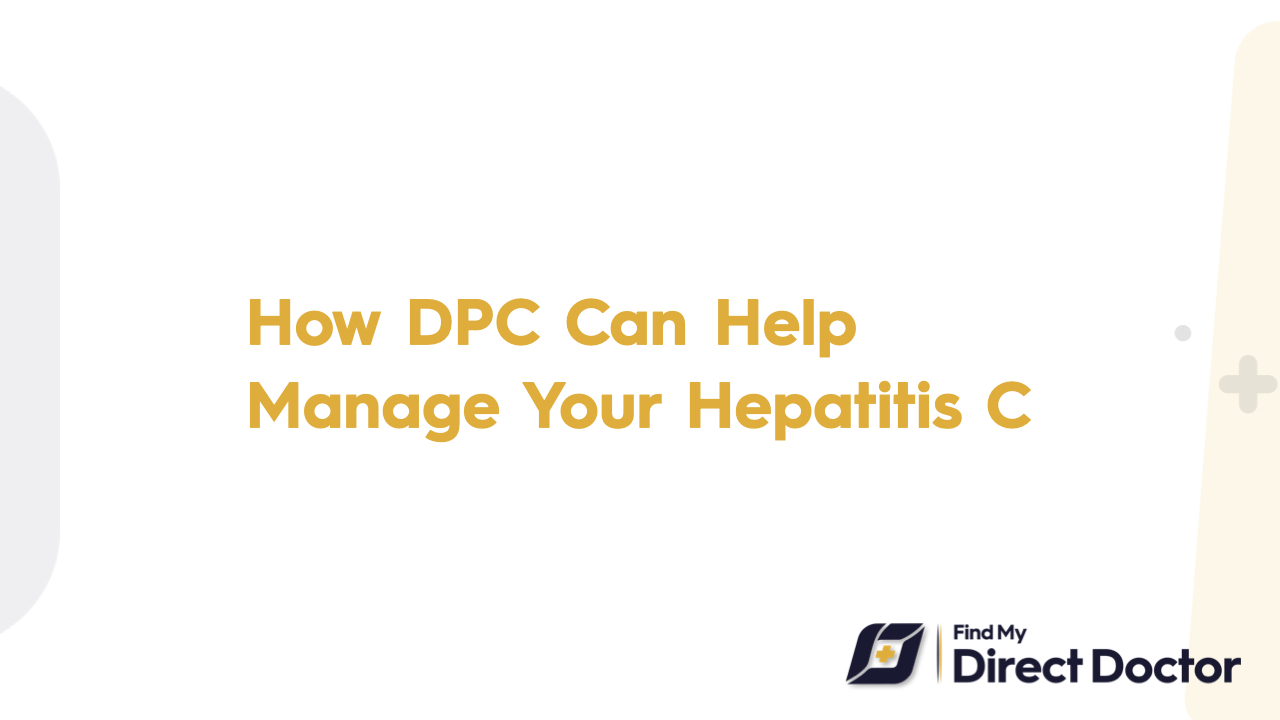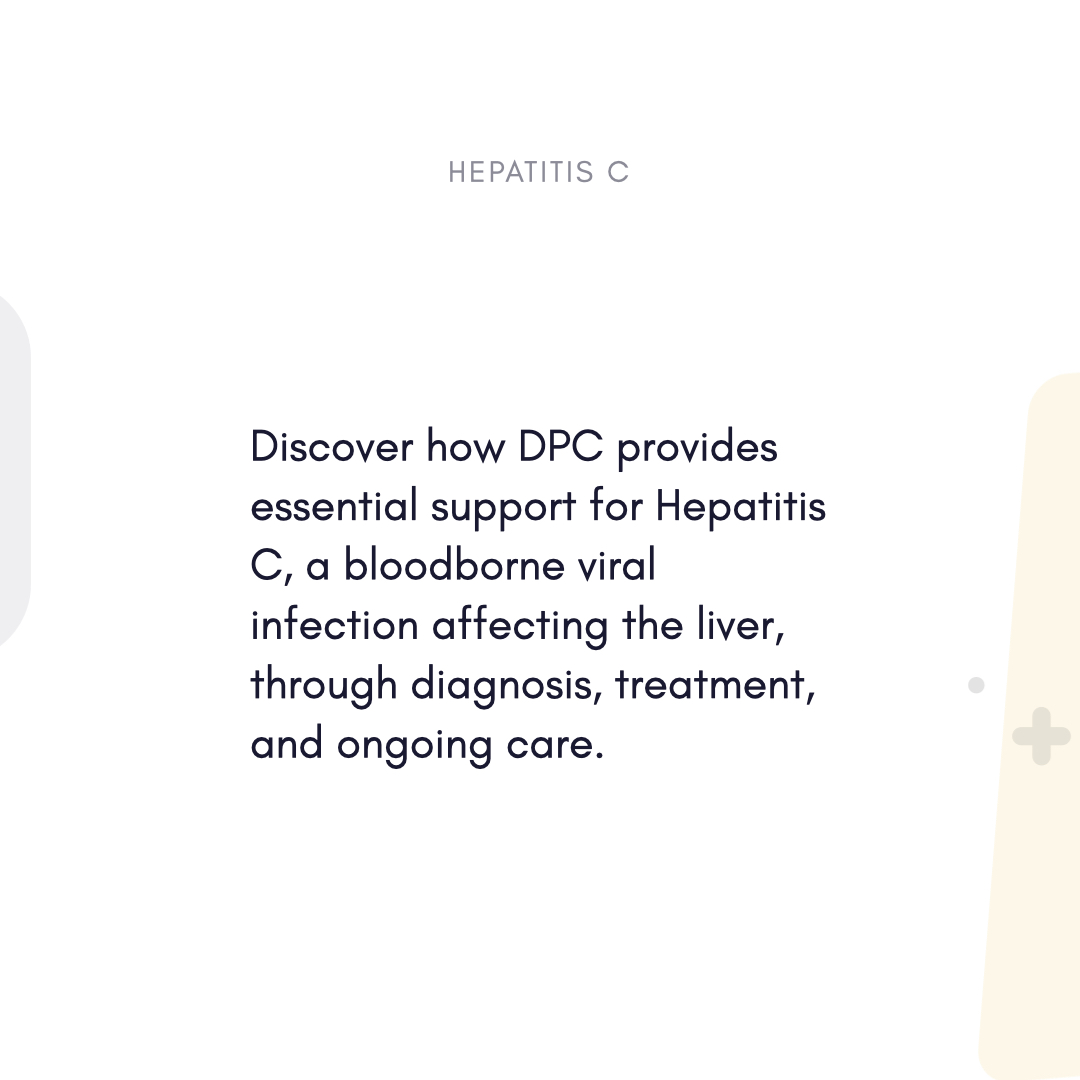Hepatitis C and Direct Primary Care (DPC): Accessible, Curative Care for Lasting Liver Health
If treated, the viral infection Hepatitis C (HCV) passed through blood can cause cancer, cirrhosis, or chronic liver disease. Delivering timely, reasonably priced access to life-saving treatments and tailored care, Direct Primary Care (DPC)—a membership-based model with flat monthly fees—ensures patients achieve cure and long-term wellness free from insurance restrictions.

Knowing Hepatitis C Transmission
- Blood-to-blood contact—that is, shared needles, unsterile medical equipment.
- Often asymptomatic early; advanced cases cause jaundice, stomach pain, tiredness.
- In 8–12 weeks, direct-acting antivirals (DAAs) such as sofosbuvir/velpatasvir achieve >95% cure rates.
- Complications are cirrhosis, liver failure, hepatocellular carcinoma (HCC).
DPC Improves Hepatitis C Management
- On first visits, confirm HCV with antibody and RNA PCR tests same-day testing.
- To stage liver damage, coordinate FibroScan® or elastography.
- DAA Therapy for Curatives
- Tailor DAAs (e.g., glecaprevir/pibrentasvir for all genotypes) to meet specific needs based on genotype.
- Medication Access: Bargain for generics at 90% less (e.g., USD 300,000+ historically against).
- Counsel on safe practices (needle hygiene, avoidance of unsterile tattoos) in prevention and long-term care reinfection education.
- For high-risk patients (cirrhosis), biannual liver ultrasounds coupled with AFP screening for cancer.
Main advantages of DPC for patients with Hepatitis C
- Greater Treatment Acceptance
- Higher Initiation Rates: Whereas 34% of patients in hospital environments start DAAs, 75% of primary care patients do.
- DAAs' safety and effectiveness let primary care doctors treat conditions without specialist referrals.
- Affordable Medical Treatment
- Monthly Rates (USD 100–USD 200): Flat Fees Cover labs, exams, and care coordination—no surprise bills.
- Primary care treatment starting costs are seventy percent less than hospital-based treatment costs overall.
- Enhanced Accessibility
- 24/7 Telehealth refers to... Quickly address side effects (rare) or concerns.
- DPC avoids specialized shortages, so allowing faster treatment starts.
DPC Customized Hepatitis C Management
- Customised Treatment Strategies
- Change DAAs for kidney disease, HIV coinfection, or substance use disorders.
- Decisions Based on Patient-Centered Approach: Incorporate preferences (such as pill burden or shorter regimens).
- Post-Cure Wellness
- Weight control, nutrition plans, and help with alcohol cessation.
- For cirrhotic patients—even those following a post-cure—biannual HCC surveillance is ongoing.
- Population At High Risk Focus
- Active Substance Users: Working with addiction experts will help to guarantee adherence.
- HIV coinfection: Work with infectious disease specialists on coordinated dual treatment.
Practical Influence
- Anna's DPC provider tested her genotype (2) following her diagnosis of HCV and prescribed sofosbuvir/velpatasvir.
- Weekly monitored HCV RNA to confirm 8-week SVR.
- Offered dietary advice and tools for alcohol quitting.
- Anna stays HCV-free with yearly liver tests.
FAQs on Hepatitis C and DPC
- Can DPC treat Hepatitis C?
- A: Definitely! DAAs heal over 95% of cases. DPC guarantees reasonably quick access at reasonable cost.
- Can DAAs be safe with other drugs?
- A: DPC adjusts regimens by reviewing drug interactions—that is, antiretrovirals, statins.
- Q: How soon after surgery should I start drinking alcohol?
- A: If cirrhosis exists, stay away from alcohol always. DPC offers specific advice.
- Q: Is reinfection possible?
- A: DPC teaches harm reduction—that is, safe needle techniques—to stop reinfection.
Why DPC Changes HCV Treatment Recommendation?
- Synced: follows DAA use and monitoring AASLD/WHO guidelines.
- Affordable generics and flawless coordination of treatment remove barriers.
- Education on lifestyle changes and transmission avoidance helps empower patients.
- Higher treatment intake helps primary care to achieve cure rates equivalent to specialist treatment.
Reclaim Your Health with the Curative Approach of DPC
Hepatitis C is treatable; DPC removes obstacles to treatment. All through one, reliable provider, same-day testing, discounted generics, and ongoing support will help you eradicate HCV and protect your liver.






